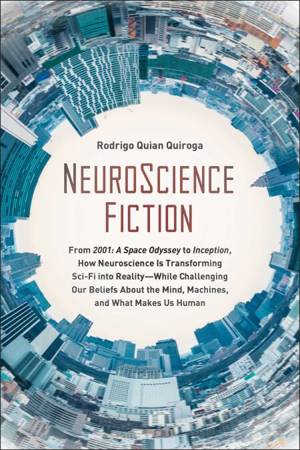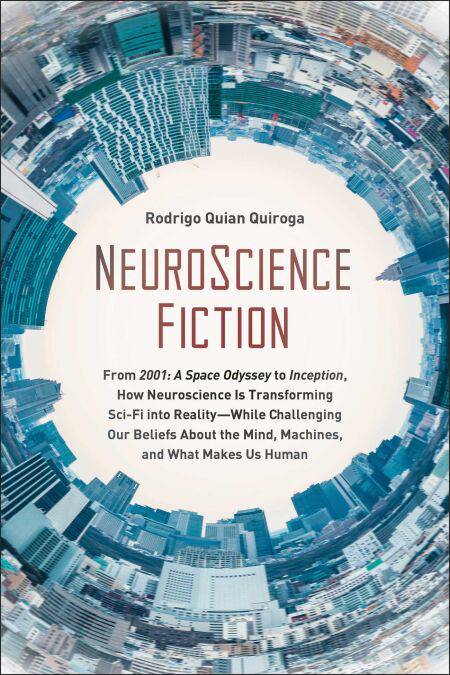
Bedankt voor het vertrouwen het afgelopen jaar! Om jou te bedanken bieden we GRATIS verzending (in België) aan op alles gedurende de hele maand januari.
- Afhalen na 1 uur in een winkel met voorraad
- In januari gratis thuislevering in België
- Ruim aanbod met 7 miljoen producten
Bedankt voor het vertrouwen het afgelopen jaar! Om jou te bedanken bieden we GRATIS verzending (in België) aan op alles gedurende de hele maand januari.
- Afhalen na 1 uur in een winkel met voorraad
- In januari gratis thuislevering in België
- Ruim aanbod met 7 miljoen producten
Zoeken
NeuroScience Fiction E-BOOK
How Neuroscience Is Transforming Sci-Fi into Reality-While Challenging Our Belie fs About the Mind, Machines, and What Makes us Human
Rodrigo Quian Quiroga
E-book | Engels
€ 8,94
+ 8 punten
Uitvoering
Omschrijving
What if science fiction stopped being fiction?
Developments in neuroscience are turning sci-fi scenarios into reality, and causing us to revisit some of the philosophical questions we have been asking ourselves for centuries.
Science fiction often takes its inspiration from the latest science . . . and our oldest questions. After all, the two are inextricably linked. At a time when advances in artificial intelligence are genuinely leading us closer to a computer that thinks like a human, we can't help but wonder: What makes a person a person?
Countless writers and filmmakers have created futuristic scenarios to explore this issue and others like it. But these scenarios may not be so futuristic after all.
In the movie Inception, a group of conspirators implants false memories; in Until the End of the World, a mad scientist is able to read dreams; in 2001: A Space Odyssey, a supercomputer feels and thinks like a person. And in recent years, the achievements described in leading scientific journals have included some that might sound familiar: implanting memories using optogenetics, reading the mind during sleep thanks to advanced decoding algorithms, and creating a computer that uses deep neural networks to surpass the abilities of human thought.
In NeuroScience Fiction, neuroscientist and author Rodrigo Quiroga reveals the futuristic present we are living in, showing how the far-out premises of 10 seminal science fiction movies are being made possible by discoveries happening right now, on the cutting edge of neuroscience. He also explores the thorny philosophical problems raised as a result, diving into Minority Report and free will, The Matrix and the illusion of reality, Blade Runner and android emotion, and more.
A heady mix of science fiction, neuroscience, and philosophy, NeuroScience Fiction takes us from Vanilla Sky to neural research labs, and from Planet of the Apes to what makes us human. This is a book you'll be thinking about long after the last page—and once you've read it, you'll never watch a sci-fi blockbuster the same way again.
Developments in neuroscience are turning sci-fi scenarios into reality, and causing us to revisit some of the philosophical questions we have been asking ourselves for centuries.
Science fiction often takes its inspiration from the latest science . . . and our oldest questions. After all, the two are inextricably linked. At a time when advances in artificial intelligence are genuinely leading us closer to a computer that thinks like a human, we can't help but wonder: What makes a person a person?
Countless writers and filmmakers have created futuristic scenarios to explore this issue and others like it. But these scenarios may not be so futuristic after all.
In the movie Inception, a group of conspirators implants false memories; in Until the End of the World, a mad scientist is able to read dreams; in 2001: A Space Odyssey, a supercomputer feels and thinks like a person. And in recent years, the achievements described in leading scientific journals have included some that might sound familiar: implanting memories using optogenetics, reading the mind during sleep thanks to advanced decoding algorithms, and creating a computer that uses deep neural networks to surpass the abilities of human thought.
In NeuroScience Fiction, neuroscientist and author Rodrigo Quiroga reveals the futuristic present we are living in, showing how the far-out premises of 10 seminal science fiction movies are being made possible by discoveries happening right now, on the cutting edge of neuroscience. He also explores the thorny philosophical problems raised as a result, diving into Minority Report and free will, The Matrix and the illusion of reality, Blade Runner and android emotion, and more.
A heady mix of science fiction, neuroscience, and philosophy, NeuroScience Fiction takes us from Vanilla Sky to neural research labs, and from Planet of the Apes to what makes us human. This is a book you'll be thinking about long after the last page—and once you've read it, you'll never watch a sci-fi blockbuster the same way again.
Specificaties
Betrokkenen
- Auteur(s):
- Uitgeverij:
Inhoud
- Aantal bladzijden:
- 304
- Taal:
- Engels
Eigenschappen
- Productcode (EAN):
- 9781950665228
- Verschijningsdatum:
- 27/04/2020
- Uitvoering:
- E-book
- Beveiligd met:
- Adobe DRM
- Formaat:
- ePub

Alleen bij Standaard Boekhandel
+ 8 punten op je klantenkaart van Standaard Boekhandel
Beoordelingen
We publiceren alleen reviews die voldoen aan de voorwaarden voor reviews. Bekijk onze voorwaarden voor reviews.









